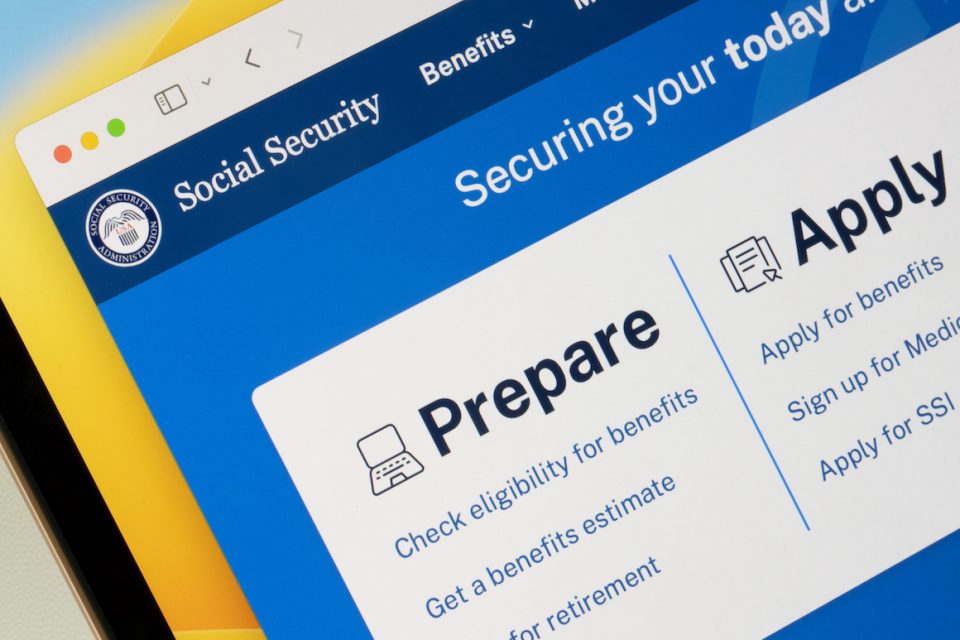As Social Security approaches its 90th birthday, uncertainty reigns…and it has been building for years. What solutions are on the horizon?
Unhappy birthday?
The reserves used to pay the nation’s 70 million recipients is expected to be depleted by 2035, according to the agency’s trustee report released earlier this year. Benefits could be cut by 17 percent if that happens.
As dire as the warnings are, they are not new. Yet, Congress has failed to take the actions necessary to shore up and extend the life of the Social Security fund and regain the confidence of retirees and especially pre-retirees. And, unfortunately, that uncertainty often comes into play when people are deciding on when to file for benefits.
When to file for Social Security
Workers can start to draw benefits at 62, which is considered early retirement. But their benefits are drastically reduced for life by about 30 percent had they waited for full retirement age. Yet, people are increasingly choosing the option because they worry that the money won’t be there if they wait.
“The worst thing that is happening here – because of Congress not acting – is you do have people saying, I’m just going to grab it as soon as I can, because I’m afraid it’s not going to be there,” says Franklin, a Certified Financial Planner.
You are entitled to full benefits at full retirement age, which is 66 if you were born from 1943 to 1954. It increases gradually if you were born from 1955 to 1960 until it reaches 67. However, for every year you wait after that, your benefits increase by an additional 8 percent, until age 70.
The Psychology of Timing Benefits
Many people take Social Security early because they need the money…but there are also psychological reasons for prematurely starting Social Security even when it doesn’t make financial sense.
“One reason is that workers, after years of payroll taxes being deducted from their paychecks, feel a sense of ownership about their future benefits – and they are eager to claim what is theirs,” according to the Center for Retirement Research.
Increasingly, though, future recipients file to take early benefits because they are afraid that benefits will not be there when they retire or that they will have to take reduced benefits. That, says Social Security expert Mary Beth Franklin, is unfortunate.
“The worst thing that is happening here – because of Congress not acting – is you do have people saying, I’m just going to grab it as soon as I can, because I’m afraid it’s not going to be there,” says Franklin, a Certified Financial Planner.
“And while there are good reasons to claim your benefits early: if you need the money, or if you’re in poor health and not likely to reach average life expectancy,” she says. “But it’s a shame that people are grabbing permanently reduced benefits out of fear.” She puts the blame squarely in the lap of Congress. “You should at least be giving some sort of reassuring messages to the American public, so people aren’t grabbing these reduced benefits early.”
Some solutions
Increasing the income subject to Social Security. While Congress has yet to act to shore up the system, one proposal under consideration is increasing the income subject to Social Security taxes, currently $168,600 in 2024. That has increased 20 percent in the last five years (it was $132,900 in 2019), says MaryJane LeCroy, managing director and senior wealth advisor at Linscomb Wealth in Houston, Texas. “So, I can see that increasing,” she says.
Raise the Retirement Age. Another proposal would increase the retirement age, currently 66 to 67, depending on when you were born.
Means Testing Benefits. Perhaps the most controversial is a proposal for means testing, which would reduce benefits to those whose income or assets exceed specific thresholds.
None of the proposals has received traction in Congress so far. “But something needs to be done,” says LeCroy.
Worried about Social Security? Write your elected officials. Visit here to sign an AARP petition urging Congress to act now to save Social Security.
The Current Status of Social Security
However, a few things are certain as Social Security approaches its 89th anniversary this month.
- After cost-of-living increases of 8.7 percent in 2022 and 3.2 percent in 2023, it will likely be less for 2024. We won’t have an indication until October, but initial estimates are running at 2.3 percent. “Unfortunately, though, 2025’s Social Security COLA is shaping up to be a bad-news situation, no matter how we look at it,” according to The Motley Fool, a personal finance website.
- If Americans continue recent trends, 27% will take Social Security at 62. Most Americans (60%) take Social Security before full retirement age, according to the Social Security Administration.
A Look Ahead for Social Security
Until something is done, the uncertainty about the future of Social Security will persist, especially for Gen Xers and younger.
“I’m not sure that I will always plan for Social Security for people under the age of 50 right now, LeCroy says. “I would rather err on the side of caution and be more conservative and say, let’s not rely on that (Social Security) income going forward.”
Education is the best thing you can do, says LeCroy. Read the Trustees Report and go to the SSA site to see what their benefits will be and when they should apply. “You have to just be properly educated, whether that be your own research and speaking with financial professionals and even talking to the local Social Security office if you can, to determine what is best for you,” she says.
Recent news reports warn of a massive data breach that revealed millions of social security numbers and other data. Learn more here.
YOUR TURN
What do you think will be the future for Social Security? What do you think of any of the proposed solutions? Share your thoughts in the comments!
 Rodney A. Brooks is an award-winning journalist and author. The former Deputy Managing Editor/Money at USA TODAY, his retirement columns appear in U.S. News & World Report and Senior Planet.com. He has also written for National Geographic, The Washington Post and USA TODAY and has testified before the U.S. Senate Special Committee on Aging. His book, “The Rise & Fall of the Freedman’s Bank, And Its Lasting Socio-economic Impact on Black America” was released in 2024. He is also author of the book “Fixing the Racial Wealth Gap.” His website is www.rodneyabrooks.com
Rodney A. Brooks is an award-winning journalist and author. The former Deputy Managing Editor/Money at USA TODAY, his retirement columns appear in U.S. News & World Report and Senior Planet.com. He has also written for National Geographic, The Washington Post and USA TODAY and has testified before the U.S. Senate Special Committee on Aging. His book, “The Rise & Fall of the Freedman’s Bank, And Its Lasting Socio-economic Impact on Black America” was released in 2024. He is also author of the book “Fixing the Racial Wealth Gap.” His website is www.rodneyabrooks.com
Your use of any financial advice is at your sole discretion and risk. Seniorplanet.org and Older Adults Technology Services from AARP makes no claim or promise of any result or success.
Photo – Tada Images – stock.adobe.com





COMMENTS
6 responses to “An Uncertain Birthday for Social Security”
Selecting when to take your benefit is a personal decision and one that should be factually based, not as the article strs,”based upon fear”. In terms of fixes;
Congress should repay the “loans” made earlier by ceasing the funding of ridiculous medical studies,ie,”changing the sex of honeybees*. The DS deduction limit should follow current wages and the COLA. I seriously doubt Congress will ta in e any appreciable action as they are more interrsted in character assassinations.
I know that if you’d been married for 10 years that you are entitled to your husband’s Social Security. I find it outrageous that 3 or more women can collect on one man’s Social Security. If a man gets married in his 20s and divorced several times it is possible for 3 or more women to collect.
My second thought is to raise taxable income above $168,000.
On top of COLA’s that don’t keep up with cost of living increases, some states, Colorado for example, tax the SS income. That seems greedy and wrong spirited to me. As you note, we paid in and believe “it’s our money” and having to pay taxes, on top of the outrageous, inconsistent and excessive MCare premiums, takes the thrill out of the momently check.
What can we do to enact change?
Molly — The Federal government also taxes your SS income unless your overall income is very low. As I understand it, that the formula for the taxing of SS income hasn’t been inflation adjusted since it was started. If I’m right — perhaps AARP could confirm this — start right there. Demand that your state and federal representatives do something to eliminate or adjust the taxing of SS income. Next demand that no one who hasn’t paid in gets SS. I could go on but I out of “characters”.
Preach!
I did wait for my full retirement benefits from social security by once again the government did Not give me accurate information. I was still working and they didn’t explain that my benefits would increase if I waited to take them at 70. The smart thing I did was invest those payments in my brokerage account and made more than I would have if I had waited. My Grandmother always told me to never rely on the government and that has proven to be true to this day! Educate yourself
Sign Up for Newsletters
There’s always a lot going on in the Senior Planet universe. Get our newsletters to make sure you never miss a thing!
Sign Up Now
Join Senior Planet Community
Senior Planet Community is our social media platform designed specifically for older adult users. Engage in thought-provoking discussions, make new friends, and share resources all on a safe and ad-free platform.
Join the Conversation Today
Upcoming Online Classes
Calendar of Events
S Sun
M Mon
T Tue
W Wed
T Thu
F Fri
S Sat
0 events,
0 events,
15 events,
Stronger Bones
Stronger Bones
Activate the joints and muscles and increase mental focus during this exercise class.
Morning Stretch
Morning Stretch
Start your day with a short morning stretch!
Protecting Your Personal Info Online
Protecting Your Personal Info Online
Registration required.
Learn how to stay safe while you surf the web!
Introduction to Hosting on Zoom
Introduction to Hosting on Zoom
In this introductory lecture, we'll go over what you need to start your first meeting, as well as some hosting tips to make it a success.
Chair Yoga
Chair Yoga
Follow various cues to develop body alignment and breath awareness.
14 events,
4
Morning Stretch
Morning Stretch
Start your day with a short morning stretch!
Virtual Tour: Palma de Mallorca, Spain
Virtual Tour: Palma de Mallorca, Spain
Join Senior Planet and our tour guides from Discover Live for a virtual visit to Spain!
Fit Fusion Workout
Fit Fusion Workout
Get your heart pumping during this fun, high-energy workout!
Google 地圖
Google 地圖
來學習 Google 地圖如何融入您的日常生活。
Cloud Storage
Cloud Storage
Registration required.
Learn the basics of cloud storage — a technology that lets you store documents, images, and other media files remotely.
14 events,
5
Balance/Strength
Balance/Strength
Activate the joints and muscles to become limber and increase balance during this exercise class.
Morning Stretch
Morning Stretch
Start your day with a short morning stretch!
Introduction to Social Media
Introduction to Social Media
Learn about some of the more popular social media sites like Facebook, Twitter, Instagram, TikTok and LinkedIn.
Introduction to Estate Planning Resources & Tools
Introduction to Estate Planning Resources & Tools
Registration required.
A simple plan is better than no plan! Get to know a few free and low-cost resources that make it simple to plan your estate.
Tips for Being News Savvy Online
Tips for Being News Savvy Online
Registration required.
Sharing the news? Learn to read and check sources before sharing!
10 events,
6
Morning Stretch
Morning Stretch
Start your day with a short morning stretch!
Introducción a X, (anteriormente Twitter)
Introducción a X, (anteriormente Twitter)
¿Ha escuchado de X? Le damos la bienvenida a esta sesión de resumen sobre la plataforma X.
Understanding Internet Plans
Understanding Internet Plans
Faster is not always better! Come learn about home internet options so you only pay for what you need.
Taijiquan (Tai Chi)
Taijiquan (Tai Chi)
Relax your mind and strengthen your body with this gentle exercise class.
Internet of Things: Healthcare
Internet of Things: Healthcare
Registration required.
Come learn how the medical industry is embracing the Internet of Things (IoT) technology to treat patients remotely.
3 events,
7
Job Searching in the Digital Age
Job Searching in the Digital Age
This lecture will provide an overview of how to use social media in your job search, demonstrate digital job searching tools like LinkedIn, and offer tips and advice to job seekers.
Using Google Docs Templates for Resumes
Using Google Docs Templates for Resumes
Don't worry about formatting your resume. Let the templates do the work for you!
Social Media for Job Searches
Social Media for Job Searches
In this lecture, we’ll discuss ways to make sure social media helps you when you’re looking for work!
0 events,
8
15 events,
9
Good Morning, Senior Planet!
Good Morning, Senior Planet!
Start your week off right with a preview of the week's upcoming programs and a guided meditation session!
Morning Stretch
Morning Stretch
Start your day with a short morning stretch!
Introduction to Heart Rate Monitor Apps
Introduction to Heart Rate Monitor Apps
Registration required.
Did you know your phone can measure your heart rate? Learn about free heart rate monitor apps and why they can be useful.
Functional Strength Training
Functional Strength Training
Use bodyweight, bands, and dumbbells to build your strength.
Fit Fusion Workout
Fit Fusion Workout
Get your heart pumping during this fun, high-energy workout!
16 events,
10
Stronger Bones
Stronger Bones
Activate the joints and muscles and increase mental focus during this exercise class.
Morning Stretch
Morning Stretch
Start your day with a short morning stretch!
Digital Coupon Tools
Digital Coupon Tools
Learn how digital coupon tools can help you save money!
Meal Kit Services
Meal Kit Services
Don't want to cook? Learn about meal kit services that take the stress out of meal time!
AI & Disinformation
AI & Disinformation
Seeing might not mean believing anymore. Come learn how to identify deepfakes and cloned voices so you don't fall for digital deception.
13 events,
11
Morning Stretch
Morning Stretch
Start your day with a short morning stretch!
Intro to Translation Tools
Intro to Translation Tools
This lecture will introduce digital translation tools and apps, such as Google Translate.
Fit Fusion Workout
Fit Fusion Workout
Get your heart pumping during this fun, high-energy workout!
雲端儲存空間
雲端儲存空間
來聆聽為什麼您會想要開始使用雲端儲存空間。
Telemedicine
Telemedicine
Registration required.
This lecture provides an overview of telemedicine options and focuses on exploring virtual medical appointments with your doctor in real-time.
13 events,
12
Balance/Strength
Balance/Strength
Activate the joints and muscles to become limber and increase balance during this exercise class.
Morning Stretch
Morning Stretch
Start your day with a short morning stretch!
iPhones
iPhones
Curious about iPhones? Come to this lecture for an overview of their features.
Graphic Design Tools
Graphic Design Tools
In this presentation, we'll explore the popular design platform, Canva, and demonstrate how you can get very creative with basic tools like Google Slides.
Chair Yoga
Chair Yoga
Follow various cues to develop body alignment and breath awareness.
10 events,
13
Morning Stretch
Morning Stretch
Start your day with a short morning stretch!
Internet de las cosas: estilo de vida y entretenimiento
Internet de las cosas: estilo de vida y entretenimiento
¡Descubra cómo el Internet de las cosas está cambiando la industria del entretenimiento!
Virtual Museum Tours
Virtual Museum Tours
In this lecture we'll explore some of these virtual galleries, as well as digital tools that help bring art, architecture, and history to life!
Taijiquan (Tai Chi)
Taijiquan (Tai Chi)
Relax your mind and strengthen your body with this gentle exercise class.
Smartphone Camera Uses Beyond Photography
Smartphone Camera Uses Beyond Photography
Come learn about QR codes, augmented reality apps, and more!
3 events,
14
Cloud Storage
Cloud Storage
Learn the basics of cloud storage — a technology that lets you store documents, images, and other media files remotely.
Google Workspace
Google Workspace
Learn about some of Google's most popular productivity tools that are for personal use, as well as work-related ones.
Internet of Things at a Glance
Internet of Things at a Glance
This lecture provides an overview of the vast world of the Internet of Things and discusses best practices for keeping your devices secure.
0 events,
15
15 events,
16
Good Morning, Senior Planet!
Good Morning, Senior Planet!
Start your week off right with a preview of the week's upcoming programs and a guided meditation session!
Morning Stretch
Morning Stretch
Start your day with a short morning stretch!
Mobile Health Apps
Mobile Health Apps
Registration required.
This lecture introduces common health apps, like the iPhone's built-in app and the Google Fit app.
Functional Strength Training
Functional Strength Training
Use bodyweight, bands, and dumbbells to build your strength.
Fit Fusion Workout
Fit Fusion Workout
Get your heart pumping during this fun, high-energy workout!
15 events,
17
Stronger Bones
Stronger Bones
Activate the joints and muscles and increase mental focus during this exercise class.
Morning Stretch
Morning Stretch
Start your day with a short morning stretch!
Online Shopping
Online Shopping
This lecture will provide a general introduction to shopping online using the popular website Amazon.com.
Anti-Virus & Malware Removal Programs At a Glance
Anti-Virus & Malware Removal Programs At a Glance
Registration required.
Concerned about viruses and malware? Attend this lecture to learn how to keep your device safe!
AI Image Generators
AI Image Generators
Go beyond stick figures and bring your imagination to life with AI image generators!
13 events,
18
Morning Stretch
Morning Stretch
Start your day with a short morning stretch!
Spotify
Spotify
In this lecture, you'll learn about Spotify’s important features, including how to search for songs and create your own playlists.
物聯網:智慧城市
物聯網:智慧城市
快來了解物聯網 (IoT) 技術如何被整合到全球城市的最基本功能中。
Fit Fusion Workout
Fit Fusion Workout
Get your heart pumping during this fun, high-energy workout!
Internet of Things: Wearables
Internet of Things: Wearables
Registration required.
Learn about the health, wellness, and personal safety benefits of wearable technology.
13 events,
19
Balance/Strength
Balance/Strength
Activate the joints and muscles to become limber and increase balance during this exercise class.
Morning Stretch
Morning Stretch
Start your day with a short morning stretch!
Facebook
Facebook
Facebook can be a great way to connect with old friends, share life updates, and join social groups. Learn more about the popular platform.
Affordable Home Internet
Affordable Home Internet
Don't overpay for internet. Learn about programs offering low-cost home internet that can help save you money.
Chair Yoga
Chair Yoga
Follow various cues to develop body alignment and breath awareness.
9 events,
20
Morning Stretch
Morning Stretch
Start your day with a short morning stretch!
YouTube
YouTube
This presentation will give an overview of the free content available on YouTube and show you how to navigate the site with ease.
Compras en línea
Compras en línea
¿Ha comprado algo en Amazon? ¿Quiere saber si el producto que ve en la tienda es más barato en línea? ¡Venga a aprender más sobre compras en línea!
Taijiquan (Tai Chi)
Taijiquan (Tai Chi)
Relax your mind and strengthen your body with this gentle exercise class.
Reddit at a Glance
Reddit at a Glance
Stumped? Find what you're looking for on Reddit!
3 events,
21
Digital Legacy at a Glance
Digital Legacy at a Glance
Will your digital content and social media pages live on forever? Come learn about your digital legacy options!
Introduction to Estate Planning Resources & Tools
Introduction to Estate Planning Resources & Tools
A simple plan is better than no plan! Get to know a few free and low-cost resources that make it simple to plan your estate.
Digital Scrapbooking Tools
Digital Scrapbooking Tools
Say goodbye to paper cuts! Come learn about digital scrapbooking tools.
0 events,
22
15 events,
23
Good Morning, Senior Planet!
Good Morning, Senior Planet!
Start your week off right with a preview of the week's upcoming programs and a guided meditation session!
Morning Stretch
Morning Stretch
Start your day with a short morning stretch!
Functional Strength Training
Functional Strength Training
Use bodyweight, bands, and dumbbells to build your strength.
Intro to Managing Your Privacy
Intro to Managing Your Privacy
Registration required.
Concerned about privacy? Unsure about accepting cookies? Come learn about some essential privacy tips!
Fit Fusion Workout
Fit Fusion Workout
Get your heart pumping during this fun, high-energy workout!
15 events,
24
Stronger Bones
Stronger Bones
Activate the joints and muscles and increase mental focus during this exercise class.
Morning Stretch
Morning Stretch
Start your day with a short morning stretch!
Introduction to Booking Vacation Stays Online
Introduction to Booking Vacation Stays Online
Need a vacation? Learn about popular websites and apps for booking vacation rentals.
Gardening Tech At a Glance
Gardening Tech At a Glance
Can tech give you a green thumb? Come to this lecture to find out!
Chair Yoga
Chair Yoga
Follow various cues to develop body alignment and breath awareness.
11 events,
25
Morning Stretch
Morning Stretch
Start your day with a short morning stretch!
物聯網 : 生活方式和娛樂
物聯網 : 生活方式和娛樂
本講座將探討我們日常與物聯網交互的多種方式,並了解它如何徹底改變整個行業。
Fit Fusion Workout
Fit Fusion Workout
Get your heart pumping during this fun, high-energy workout!
Smartphones at a Glance
Smartphones at a Glance
Registration required.
How smart are they? We'll tell you all about smartphones.
Functional Strength Training
Functional Strength Training
Use bodyweight, bands, and dumbbells to build your strength.
14 events,
26
Balance/Strength
Balance/Strength
Activate the joints and muscles to become limber and increase balance during this exercise class.
Morning Stretch
Morning Stretch
Start your day with a short morning stretch!
Intro to Gaming
Intro to Gaming
Game on! Come discover the world of gaming and start playing!
Google Maps
Google Maps
Registration required.
During this lecture, you’ll get an introduction to Google Maps and a demonstration of how to use it.
Introduction to Nextdoor
Introduction to Nextdoor
This presentation will introduce you to the most common uses for the Nextdoor app and its main features, along with some best practices for using it safely.
11 events,
27
Morning Stretch
Morning Stretch
Start your day with a short morning stretch!
Intro to X (formerly Twitter)
Intro to X (formerly Twitter)
Like to know what's happening? Come learn about X (formerly Twitter)!
Sitios de viajes en línea
Sitios de viajes en línea
¿A dónde quiere viajar? El internet le puede ayudar a planear su próximo viaje! ¡Aprenda con nosotros!
Taijiquan (Tai Chi)
Taijiquan (Tai Chi)
Relax your mind and strengthen your body with this gentle exercise class.
Meetup
Meetup
This lecture introduces Meetup, a popular online platform for finding social groups and events all over the world.
3 events,
28
iPhones
iPhones
Curious about iPhones? Come to this lecture for an overview of their features.
Messaging Apps
Messaging Apps
This lecture will go over the features of three widely-used apps: iMessages, Google Chats, and WhatsApp.
Emojis, GIFs, and more!
Emojis, GIFs, and more!
Learn how to use emojis, GIFs, and more to quickly say what you mean!
0 events,
29
2 events,
30
Virtual Orientation to Senior Planet
Virtual Orientation to Senior Planet
Come learn about all that Senior Planet has to offer!
Better Balance Boot Camp: Week 4
Better Balance Boot Camp: Week 4
Registration required.
Learn how to lower your risk of falling and improve your balance skills!
0 events,
1
0 events,
2
1 event,
3
Death Cafe
Death Cafe
Join this session to engage in meaningful conversation about death in a safe and open environment.
0 events,
4
0 events,
5
Stronger Bones
Morning Stretch
Protecting Your Personal Info Online
Introduction to Hosting on Zoom
Chair Yoga
Morning Stretch
Virtual Tour: Palma de Mallorca, Spain
Fit Fusion Workout
Google 地圖
Cloud Storage
Balance/Strength
Morning Stretch
Introduction to Social Media
Introduction to Estate Planning Resources & Tools
Tips for Being News Savvy Online
Morning Stretch
Introducción a X, (anteriormente Twitter)
Understanding Internet Plans
Taijiquan (Tai Chi)
Internet of Things: Healthcare
Job Searching in the Digital Age
Using Google Docs Templates for Resumes
Social Media for Job Searches
Good Morning, Senior Planet!
Morning Stretch
Introduction to Heart Rate Monitor Apps
Functional Strength Training
Fit Fusion Workout
Stronger Bones
Morning Stretch
Digital Coupon Tools
Meal Kit Services
AI & Disinformation
Morning Stretch
Intro to Translation Tools
Fit Fusion Workout
雲端儲存空間
Telemedicine
Balance/Strength
Morning Stretch
iPhones
Graphic Design Tools
Chair Yoga
Morning Stretch
Internet de las cosas: estilo de vida y entretenimiento
Virtual Museum Tours
Taijiquan (Tai Chi)
Smartphone Camera Uses Beyond Photography
Cloud Storage
Google Workspace
Internet of Things at a Glance
Good Morning, Senior Planet!
Morning Stretch
Mobile Health Apps
Functional Strength Training
Fit Fusion Workout
Stronger Bones
Morning Stretch
Online Shopping
Anti-Virus & Malware Removal Programs At a Glance
AI Image Generators
Morning Stretch
Spotify
物聯網:智慧城市
Fit Fusion Workout
Internet of Things: Wearables
Balance/Strength
Morning Stretch
Facebook
Affordable Home Internet
Chair Yoga
Morning Stretch
YouTube
Compras en línea
Taijiquan (Tai Chi)
Reddit at a Glance
Digital Legacy at a Glance
Introduction to Estate Planning Resources & Tools
Digital Scrapbooking Tools
Good Morning, Senior Planet!
Morning Stretch
Functional Strength Training
Intro to Managing Your Privacy
Fit Fusion Workout
Stronger Bones
Morning Stretch
Introduction to Booking Vacation Stays Online
Gardening Tech At a Glance
Chair Yoga
Morning Stretch
物聯網 : 生活方式和娛樂
Fit Fusion Workout
Smartphones at a Glance
Functional Strength Training
Balance/Strength
Morning Stretch
Intro to Gaming
Google Maps
Introduction to Nextdoor
Morning Stretch
Intro to X (formerly Twitter)
Sitios de viajes en línea
Taijiquan (Tai Chi)
Meetup
iPhones
Messaging Apps
Emojis, GIFs, and more!
Virtual Orientation to Senior Planet
Better Balance Boot Camp: Week 4
Death Cafe
Recent Articles
Recent Comments